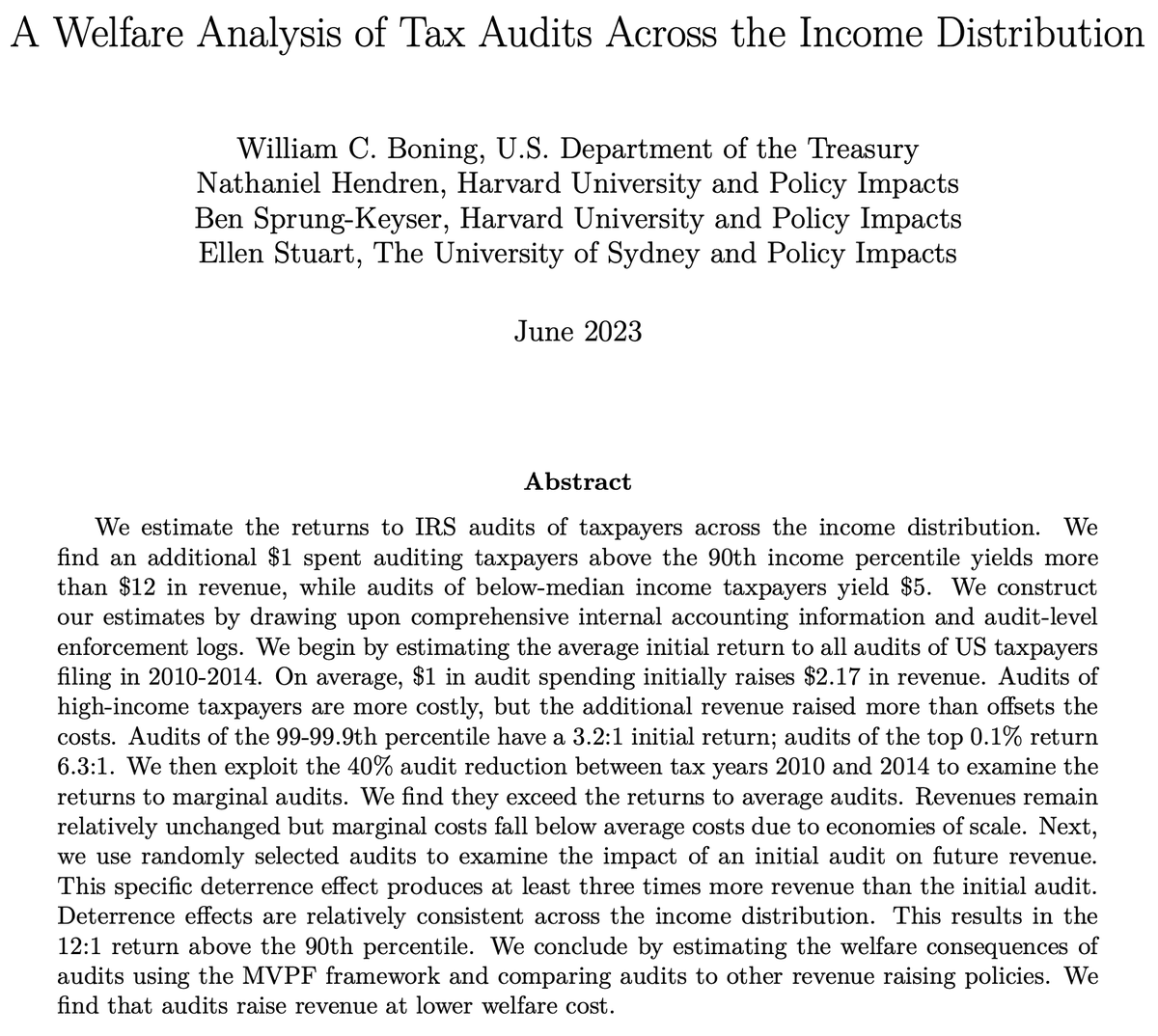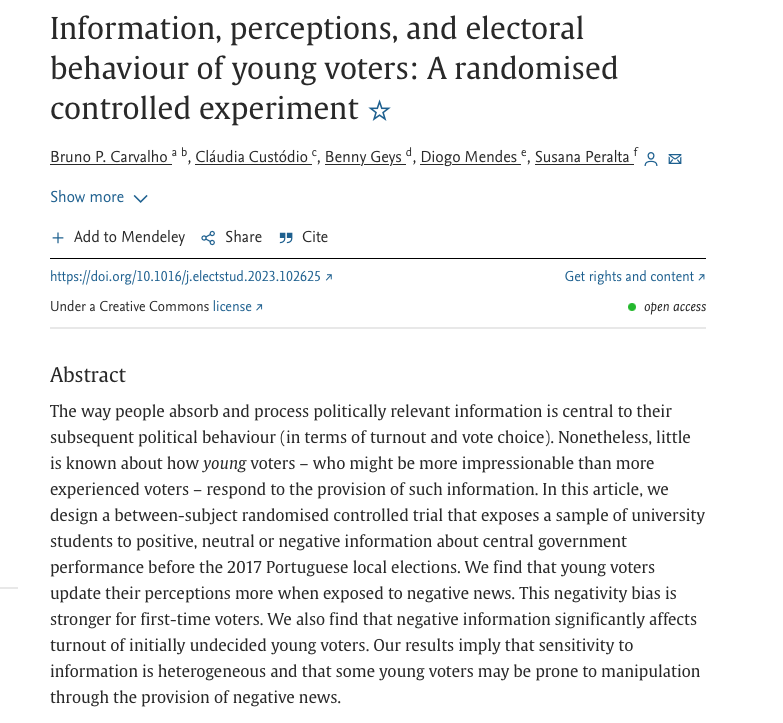Discover and read the best of Twitter Threads about #EconTwitter
Most recents (24)
1/19: Excited to share a paper on how people perceive & understand trade and trade policies!
Which factors shape the support for different trade policies? Thread below with the key takeaways #EconTwitter 🧵, and full paper here: scholar.harvard.edu/stantcheva/fil…
Which factors shape the support for different trade policies? Thread below with the key takeaways #EconTwitter 🧵, and full paper here: scholar.harvard.edu/stantcheva/fil…

2/19: The study tackles two key questions: what do people know about the impacts of trade? And, how do they weigh trade-offs when forming their views on trade policy? We conducted large-scale surveys and experiments in the US at the Social Economics Lab socialeconomicslab.org
3/19: In discussions of trade policy, it's important to think about both trade restrictions (e.g., tariffs or quotas) and compensatory redistribution to help those hurt by trade (e.g., retraining programs, direct transfers to displaced workers, support for low-income households).
#EconTwitter 🧵A question for the Econ Twitter crew. If we look at the Average Hourly Earnings (AHE) series there has been a sharp slowing of wage growth.
Annualizing over three-month periods, we went from over 6.5 percent at the start of 2022 to around 4.0 percent in recent months. This is only slightly higher than the wage growth we saw in 2018-2019, when the inflation rate was at the Fed’s 2.0 percent target.
However, the ECI shows much more modest slowing and a considerably more rapid recent rate of wage growth, going from around 5.5 percent at the start of 2022, to 4.8 percent in the first quarter.
Thread: Let us be clear -- the work of Gabriel Zucman should be taken with a major/huge grain of salt. Largely because he and his colleagues have been sloppy as hell. I will not mince words here and list the litany of sloppiness #econtwitter
First, you have to understand the following thing: the work of Zucman with Piketty and Saez (henceforth PSZ) builds heavily on a 2003 paper in QJE. I revisited the data, assumptions and methods of that paper in two published papers -- one at Economic Inquiry and the other at EJ
Without that paper, the others dont follow. Its the essential building block and changing stuff to it changes the other papers (on optimal taxation, on progressivity, on wealth inequality)
This paper in NBER (summarized at WAPO) is not saying what many think it says. It says that the state can get more revenues by auditing the rich. It doesnt say the rich cheat more! #econtwitter
Why? I used to be interested in illegal work, sidelines, underground economy etc. I can tell you that cheating at the low-end of the ladder is easier because the sums are smaller and easier to hide.
After all, working a day for $200 cash for a moving company in Montreal (I never did that) when you are low-income is easier to hide than a large sum of unreported income or deliberately inflating expenses etc.
New Paper Alert 🚨
We estimate the returns to IRS tax audits across the income distribution. We find $1 of IRS spending on audits of top earners delivers more than $12 of tax revenue. Along the way, we provide new evidence of the strong specific deterrence effects of audits. 1/:
We estimate the returns to IRS tax audits across the income distribution. We find $1 of IRS spending on audits of top earners delivers more than $12 of tax revenue. Along the way, we provide new evidence of the strong specific deterrence effects of audits. 1/:

More than $500 billion in tax obligations go unpaid each year in the US. Most of these liabilities are concentrated among high-income taxpayers. Can additional spending on audits recoup those unpaid taxes? How do the returns to audits vary across the income distribution? 2/
In joint work with Will Boning, @bsprungkeyser, and Ellen Stuart, we use detailed cost and revenue data for the universe of IRS audits. We focus on measuring the returns to in-person audits of individual taxpayers. 3/
Hi #EconTwitter!
Yearning for a deep dive into the world of 𝐭𝐢𝐦𝐞 𝐬𝐞𝐫𝐢𝐞𝐬 𝐞𝐜𝐨𝐧𝐨𝐦𝐞𝐭𝐫𝐢𝐜𝐬? 📈
Behold a compilation (from my recent tweets) of very nice lecture notes and books, freely available online, just a click away.
Hope you'll like it! 🌐

Yearning for a deep dive into the world of 𝐭𝐢𝐦𝐞 𝐬𝐞𝐫𝐢𝐞𝐬 𝐞𝐜𝐨𝐧𝐨𝐦𝐞𝐭𝐫𝐢𝐜𝐬? 📈
Behold a compilation (from my recent tweets) of very nice lecture notes and books, freely available online, just a click away.
Hope you'll like it! 🌐


Alex Aue's Time Series Analysis
Friendly introduction to Time Series Analysis, covering key principles (including spectral methods) and examples in R
batch.libretexts.org/print/Letter/F…
Friendly introduction to Time Series Analysis, covering key principles (including spectral methods) and examples in R
batch.libretexts.org/print/Letter/F…
@BruceEHansen's Advanced Time Series and Forecasting
Set of slides on time series econometrics and forecasting, covering most aspects on this topic.
ssc.wisc.edu/~bhansen/crete/
Set of slides on time series econometrics and forecasting, covering most aspects on this topic.
ssc.wisc.edu/~bhansen/crete/
Hi #EconTwitter!
Interested in the #econometrics of 𝐜𝐚𝐮𝐬𝐚𝐥 𝐢𝐧𝐟𝐞𝐫𝐞𝐧𝐜𝐞? 📈
Here's a thread with some great lecture notes, slides, and books on this topic - freely available on the web - which I've happily tweeted about! 📚🌐
Hope you'll find it useful!

Interested in the #econometrics of 𝐜𝐚𝐮𝐬𝐚𝐥 𝐢𝐧𝐟𝐞𝐫𝐞𝐧𝐜𝐞? 📈
Here's a thread with some great lecture notes, slides, and books on this topic - freely available on the web - which I've happily tweeted about! 📚🌐
Hope you'll find it useful!


𝐏𝐚𝐮𝐥 𝐆𝐨𝐥𝐝𝐬𝐦𝐢𝐭𝐡-𝐏𝐢𝐧𝐤𝐡𝐚𝐦'𝐬 (@paulgp) 𝐀𝐩𝐩𝐥𝐢𝐞𝐝 𝐄𝐦𝐩𝐢𝐫𝐢𝐜𝐚𝐥 𝐌𝐞𝐭𝐡𝐨𝐝𝐬
PhD-level slides covering econometrics, from causal inference to applied MachineLearning.
github.com/paulgp/applied…
PhD-level slides covering econometrics, from causal inference to applied MachineLearning.
github.com/paulgp/applied…
𝐏𝐞𝐧𝐠 𝐃𝐢𝐧𝐠'𝐬 (@pengding00) 𝐂𝐚𝐮𝐬𝐚𝐥 𝐢𝐧𝐟𝐞𝐫𝐞𝐧𝐜𝐞
Undergrad notes about the #statistics and #econometrics of causal inference.
arxiv.org/abs/2305.18793
Undergrad notes about the #statistics and #econometrics of causal inference.
arxiv.org/abs/2305.18793
🚨 New Working Paper 🚨
We show that applicants manipulate their address to get access to their preferred school and thereby push out non-strategic students.
Friday, so I am giving you 3 options. A gif, a 🧵, and the full paper!
#EconTwitter @ChrisANeilson @Woessmann
1/N
We show that applicants manipulate their address to get access to their preferred school and thereby push out non-strategic students.
Friday, so I am giving you 3 options. A gif, a 🧵, and the full paper!
#EconTwitter @ChrisANeilson @Woessmann
1/N
I am very happy to say our paper "Informations, perceptions and electoral behaviour of young voters" is now available in @ElectoralStdies. This is joint work with Benny Geys, @claudiacustodi0, @diogogmmendes and @speraltalisboa. #EconTwitter
A🧵👇 (1/8)
A🧵👇 (1/8)

We run an RCT where:
👉Young voters are given positive or negative info about the central government performance (different policy areas).
👉Information based on articles from mainstream Portuguese media.
👉Treatment provided right before the 2017 local election (2/8)
👉Young voters are given positive or negative info about the central government performance (different policy areas).
👉Information based on articles from mainstream Portuguese media.
👉Treatment provided right before the 2017 local election (2/8)
Our goal is to assess if:
👉 Positive and negative info have different effects on government performance perception;
👉 If an updated general government performance spills over to voting behaviour on local elections;
👉 The impact is different for younger/undecided voters. (3/8)
👉 Positive and negative info have different effects on government performance perception;
👉 If an updated general government performance spills over to voting behaviour on local elections;
👉 The impact is different for younger/undecided voters. (3/8)
Biggest thing to ever come out of my little group. Pls help spread this finding!
We found clean, CAUSAL evidence that the shingles vaccine prevents a good chunk of dementia cases. So, could a virus cause Alzheimer’s->YES!
Hear me out & see preprint: bit.ly/3MVqXU9
🧵1/
We found clean, CAUSAL evidence that the shingles vaccine prevents a good chunk of dementia cases. So, could a virus cause Alzheimer’s->YES!
Hear me out & see preprint: bit.ly/3MVqXU9
🧵1/

There’s recently been ⬆️ interest in the possibility that a virus may be involved in the causal pathways of dementia. Most attention has been on herpesviruses, incl the VZV that causes chickenpox and shingles, partly because of their lifelong latency (bit.ly/3nibvYk).
2/
2/
In Wales starting in Sept 2013, the shingles vaccine was rolled out using an exact DOB cutoff. Those born on or after Sept 2 1933 were eligible, while those born earlier weren’t and remained ineligible for life. We analyzed EHR data for all of Wales with DOB exact to the week.
3/
3/
Thread: This is a poor reading of Hayek.
The Use of Knowledge in Society (AER, 1945) does not say what Acemoglu *thinks* it says. Prices are not aggregative devices. They are knowledge-economizing devices that are cheaper than *any* other devices. #econtwitter
The Use of Knowledge in Society (AER, 1945) does not say what Acemoglu *thinks* it says. Prices are not aggregative devices. They are knowledge-economizing devices that are cheaper than *any* other devices. #econtwitter
The problem starts with fact that there is a great deal of knowledge that is simply tacit and impossible to code. Moreover, the *value* of that tacit knowledge is impossible to code as well. For example, riding a bike is hard to express into a book/code. So is coding its worth
But, the time-price, the price of an instructor, the price of a parent's time etc. are going to express the value of using this knowledge. Prices economize on all the knowledge we need to collect about bikes. They tell us how much knowledge is necessary.
I've seen some arguments on #EconTwitter that EJMR exists b/c (amongst other things), it gives people access to the "Hidden Curriculum", often not taught outside of top schools. So, in hopes of decreasing demand for EJMR, here are some other ways to access much of that same info:
"Doing Economics", by @marcfbellemare is full of tips on things like:
- communicating your research findings
- giving talks/seminars
- maximizing your chances of getting a good review
- finding funding
- writing referee reports
mitpress.mit.edu/9780262543552/
- communicating your research findings
- giving talks/seminars
- maximizing your chances of getting a good review
- finding funding
- writing referee reports
mitpress.mit.edu/9780262543552/
The podcast "The Hidden Curriculum" (by @dsebastiantello and @ajhollingsworth) is an absolute gem.
My favorite ep is actually the most recent, where they walk through how to think about an "elevator pitch", and constructively critique a few JMCs' examples.
open.spotify.com/show/0OtkSXW04…
My favorite ep is actually the most recent, where they walk through how to think about an "elevator pitch", and constructively critique a few JMCs' examples.
open.spotify.com/show/0OtkSXW04…
Are you concerned or simply wondering about the impact of the internet on mental health? Check out the latest version of “Lost in the Net? Broadband Internet and Youth Mental Health” joint with @DonatiDante @RDurante_2020 and Dijana Zejcirovic #mentalhealth #econtwitter 1/n 

We present new evidence based on Italian administrative data on the universe of mental disorders diagnosed by hospital doctors between 2001-2013 to patients below 40 years of age, which we combine with granular info on access to broadband internet at the municipality level. 2/n 

Our identification strategy exploits differences in the proximity of municipalities to the pre-existing voice telecommunication infrastructure, which was previously irrelevant but became salient after the advent of the internet (Campante, Durante & Sobbrio, 2018) 3/n
Bookmark sharing time #EconTwitter! I put together my recent collection of practical tips on how to use AI to boost productivity and present them in order of my own (very short) journey (1/8)
#2 If you are a beginner this is a good one that got me started. The first & key step is “writing good prompts”. Just like learning a new language (but a relatively easy one I’d say compared to Spanish!)
#3 I then practiced how to write prompts for turning an web article (about UK asylum applications, something random I was reading!) into different types of summary (5 bullet points for experts or policy makers, 100 words for a kid, etc.) following this guide:
⚡JUST IN
#China April official #PMI
Manufacturing PMI 49.2 [Est.51.4 Prev.51.9]
Non-Manufacturing PMI 56.4 [Est.57 Prev.58.2]
Composite PMI 54.4 [Prev.57]
#manufacturing #EconTwitter 🇨🇳 1/


#China April official #PMI
Manufacturing PMI 49.2 [Est.51.4 Prev.51.9]
Non-Manufacturing PMI 56.4 [Est.57 Prev.58.2]
Composite PMI 54.4 [Prev.57]
#manufacturing #EconTwitter 🇨🇳 1/



NBS: The PMI for China's manufacturing sector decreased by 2.7 PPs m/m, falling into the contraction zone after running above 50% for three consecutive months.
However, the financial situation of enterprises has improved, and enterprises are relatively optimistic about future.
2/
However, the financial situation of enterprises has improved, and enterprises are relatively optimistic about future.
2/
NBS: the new export order index was 47.6%, -2.8 PPs m/m, with two consecutive months of significant declines.
Surveys show that the proportion of companies reflecting insufficient market demand was 56.9%, an increase of 1.6 PPs m/m, reaching a new high in 36 months.
3/
Surveys show that the proportion of companies reflecting insufficient market demand was 56.9%, an increase of 1.6 PPs m/m, reaching a new high in 36 months.
3/
“Income-Based Affirmative Action in College Admissions” is online at the Economic Journal’s site! In this project w/@_Herskovic and @joaoramosecon,we show that income-based affirmative action in college admissions can increase welfare and efficiency simultaneously.🧵#EconTwitter
Student-level microdata from Brazil show that high-income students outperform low-income students with similar demographic characteristics. This pattern is weakened but still holds if one compares students in the same classroom. 

However, this relation is reversed after controlling for college-admission scores: low-income students outperform their higher-income peers in college when they have the same college-admission score.
"We use several formal representations of the consumption–investment trade-off in growth theory, found in the Harrod–Domar growth model, the Feldman–Mahalanobis model and Kalecki’s 1963 growth model" #econtwitter @paulkrugman @Noahpinion academic.oup.com/cje/advance-ar…
(2018) I would change some things now or say differently, but some basic ideas hold that are relevant to the OP. clintballinger.com/2018/11/08/the…
Also, this superbly details how development policy faces profound issues that transcend the framework in the "Weaknesses" article:
"The Long, Slow Death of Global Development"
americanaffairsjournal.org/2022/11/the-lo…
@davideoks @humford
"The Long, Slow Death of Global Development"
americanaffairsjournal.org/2022/11/the-lo…
@davideoks @humford
Hey #econtwitter, I'm excited to share a new WP with @conlon_chris about micro data (e.g. consumer surveys) in BLP estimation. Alongside it, we finally released PyBLP version 1.0!
Paper: jeffgortmaker.com/files/micro.pdf
Code: github.com/jeffgortmaker/…
Docs: pyblp.readthedocs.io/en/stable/
1/16

Paper: jeffgortmaker.com/files/micro.pdf
Code: github.com/jeffgortmaker/…
Docs: pyblp.readthedocs.io/en/stable/
1/16


Since releasing version 0.1 with our 2020 paper (onlinelibrary.wiley.com/doi/10.1111/17…), the most common request has been micro moments.
So we dug through published/recent WPs to see how "micro BLP" has been used in practice. Turns out it's been used a lot. Let us know who we missed!
2/16
So we dug through published/recent WPs to see how "micro BLP" has been used in practice. Turns out it's been used a lot. Let us know who we missed!
2/16

There have been a number of new contributions around ethics questions in RCTs or field research more broadly lately so doing a mini- 🧵on ethics papers that are useful for all of us to review #EconTwitter
@DaveEvansPhD has a brand-new paper in Journal of Development Effectiveness about ethics in RCTs, w/useful points for reflection in different stages (planning / conducting / publishing)
tandfonline.com/doi/full/10.10…
tandfonline.com/doi/full/10.10…
One recent paper from Asiedu @Monica_Lambon @deankarlan @chrisudry proposed a structured ethics appendix for social science papers as an opportunity to reflect on + refine key ethics norms
I'm excited to share our new paper w/ @mungowitz and @m_zavlanos introducing a decentralized mechanism for pricing and exchanging alternatives constrained by transaction costs: a thread 🧵 1/n 

Our decentralized model is based on max-plus (linear) algebra, a branch of tropical 🌴 geometry. The recipe is simple: times <- plus, plus <- max. Max-plus algebra reinvents linear algebra with varying degrees of success, e.g. eigenvalues, linear systems, regression... 2/n
We use max-plus algebra to model the effective value of alternatives (e.g. goods, even opinions 🤔), taking transaction costs with neighbors in a trade network into account. This results in the data of a max-plus matrix-weighted graph. 3/n
Today's cool young researcher #EconTwitter is @JulieSantamaria at the IADB who works on migration, health, + gender
juliethsantamaria.com
juliethsantamaria.com
One paper joint w/@lucia_hanmer Rubiano + Arango shows that gender inequalities among a Syrian refugee population amplifies poverty, w/female-headed households particularly vulnerable
tandfonline.com/doi/abs/10.108…
tandfonline.com/doi/abs/10.108…
Another closely related paper shows this poverty gender gap among Syrian refugee hh is also increasing over time
openknowledge.worldbank.org/entities/publi…
openknowledge.worldbank.org/entities/publi…
🤖🛑 Hitting the breaks on AI?
(1) Alignment worries: perhaps legit. But don't have much to say.
(2) Job automation concerns: LLMs ≠ robots. Economic arguments for slowing down automation are much weaker for LLMs.
Why? Let's dive in! #EconTwitter #FutureOfWork #AI #ChatGPT
(1) Alignment worries: perhaps legit. But don't have much to say.
(2) Job automation concerns: LLMs ≠ robots. Economic arguments for slowing down automation are much weaker for LLMs.
Why? Let's dive in! #EconTwitter #FutureOfWork #AI #ChatGPT
Economists have put forth two main arguments for slowing down technologies that automate jobs and displace workers. The first is based on redistributive considerations. The second is based on efficiency considerations.
In a nutshell, the redistributive rationale is as follows. If automation displaces workers who are relatively poor, then this increases inequality. Absent other tools to directly redistribute (e.g., transfers to workers) a government should curb automation to reduce inequality.
A STN lança hoje a história “Deslocamentos e gastos hospitalares dos municípios brasileiros”, que traz dados sobre deslocamentos feitos por cidadãos em busca de tratamentos de saúde não fornecidos em suas cidades de origem.
#rstats #dataviz #EconTwitter
…atendimento-hospitalar.tesouro.gov.br




#rstats #dataviz #EconTwitter
…atendimento-hospitalar.tesouro.gov.br




Constatou-se que cerca de um terço dos atendimentos médicos foi prestado a pessoas de outros municípios. A cidade brasileira que mais recebeu pacientes de outras cidades foi Recife, superando inclusive São Paulo em valores absolutos. #atendimentohospitalar #Recife #SãoPaulo 

Os dados foram obtidos da base de atendimentos hospitalares do DATASUS, em cruzamento com os dados do IBGE e da STN. A maioria das cidades de pequeno porte possui gastos bastante inferiores às de médio e grande porte. #opendata
Weil der FAZ-Beitrag über den Zustand der VWL (u.a. mit Jakob Kapeller @heterodoxnews/ @ifso_due) ⬇️ wieder ein paar unterkomplexe #EconTwitter-Reaktionen provozierte, ein Service-Thread mit ein paar Erkenntnissen aus der Pluralo-Forschung. 1/12faz.net/aktuell/karrie…
1. Einen guten Einstieg zur Problematik, mit Verweisen auf aktuelle Forschung, bietet nach wie vor das Impulspapier @PluralEcon.⬇️plurale-oekonomik.de/wp-content/upl… [PDF] Es ist nicht zu viel verlangt, zumindest das zur Kenntnis zu nehmen. Mindestanspruch an die, die mitreden wollen! 2/12
Die VWL-Lehre im deutschsprachigen Bereich war Gegenstand von Untersuchungen, die deren Einseitigkeit belegen.
2. EconPlus-Studie
2a) 👉exploring-economics.org/de/entdecken/d…
2b) 👉exploring-economics.org/de/entdecken/a…
2c) in Buchform: Beckenbach/ Daskalakis /Hofmann (2016)👉metropolis-verlag.de/Zur-Pluralitae…
3/12
2. EconPlus-Studie
2a) 👉exploring-economics.org/de/entdecken/d…
2b) 👉exploring-economics.org/de/entdecken/a…
2c) in Buchform: Beckenbach/ Daskalakis /Hofmann (2016)👉metropolis-verlag.de/Zur-Pluralitae…
3/12



